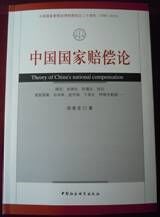
Chen Chunlong, Theory of State Compensation in China, Beijing: China Social Sciences Press, 2015.
This book, based on the existing research results both in China and abroad, in light of 20 years of legislative, judicial and law enforcement practice in the field of state compensation, and standing on a new theoretical height, summarizes the theory of state compensation into four parts, namely: introduction, ontology, circumstance theory, and conclusion. It sums up the process of establishment, development and perfection of the legal system of state compensation in China, explores in a deep-going way the theoretical value of the basic content of state compensation law, analyzes the external factors affecting the judicial practice of state compensation in China, and, for the first time in Chinese history, draws the conclusion that the legal system of state compensation is a common achievement of the rule of law civilization of the mankind. The most prominent feature of this book is linking theory with practice: every viewpoint put forward in the book corresponds to a concrete practice. By doing so, it summarizes the following nine main problems in the judicial practice of state compensation in China: observance and improvement of criminal procedure, presumption of guilt, presumption of innocence, and in dubio pro reo, motivations and measures for the prevention of the practice of extorting a confession by torture, the current situation and the reform of the forensic authentication system, the power and responsibilities of judicial organs in capital cases, improvement and strengthening of the legal supervision by procuratorates, judicial fairness and elimination of local interference in administration of justice, leadership by the ruling party and independent exercise of judicial power, and improvement of the quality of citizens and the enhancement of the awareness of law, and put forward countermeasures for solving these problems. In the appendix of the book are introduction and analysis of nine most influential cases of miscarriage of justice and state compensation that have been exposed in the past decade in China.


